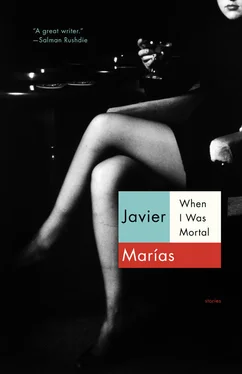I see myself, for example, as a child about to fall asleep in my bed on the countless nights of a childhood that was satisfactory or without surprises, with my bedroom door ajar so that I could see the light until sleep overcame me, being lulled by the voices of my father and my mother and a guest at supper or some late arrival, who was almost always Dr Arranz, a pleasant man who smiled a lot and spoke in a low voice and who, to my delight, would arrive just before I went to sleep, in time to come into my room to see how I was, the privilege of an almost daily check-up and the calming hand of the doctor slipping beneath your pyjama jacket, the warm and unrepeatable hand that touches you in a way that no one else will ever touch you again throughout your entire life, the nervous child feeling that any anomaly or danger will be detected by that hand and therefore stopped, it is the hand that saves; and the stethoscope dangling from his ears and the cold, salutary touch that your chest shrinks from, and sometimes the handle of an inherited silver spoon engraved with initials placed on the tongue, and which, for a moment, seems about to stick in your throat, a feeling that would give way to relief when I remembered, after the first contact, that it was Arranz holding the spoon in his reassuring, steady hand, mistress of metallic objects, nothing could happen while he was listening to your chest or peering at you with his torch fixed on his forehead. After his brief visit and his two or three jokes — sometimes my mother would lean in the doorway waiting until he had finished examining me and making me laugh, and she would laugh too — I would feel even more at ease and would begin to fall asleep listening to their chatter in the nearby lounge, or listening to them listening for a while to the radio or playing a game of cards, at a time when time barely passed, it seems impossible because it’s not that long ago, although from then until now enough time has elapsed for me to live and die. I hear the laughter of those who were still young, although I couldn’t see them as young then, I can now: my father laughed the least, he was a handsome, taciturn man with a look of permanent melancholy in his eyes, perhaps because he had been a republican and had lost the war, and that is probably something you never recover from, having lost a war against your compatriots and neighbours. He was a kindly man who never got angry with me or my mother and who spent a lot of time at home writing articles and book reviews, which he tended to publish under various pseudonyms in the newspapers, because it was best not to use his own name; or perhaps reading, he was a great francophile, I mainly recall novels by Camus and Simenon. Dr Arranz was a jollier man, with a lazy, teasing way of talking, inventive and full of unusual turns-of-phrase, the kind of man children idolize because he knows how to do card tricks and comes out with unexpected rhymes and talks to them about football — then it was Kopa, Rial, Di Stefano, Puskas and Gento — and he thinks up games that will interest them and awaken their imaginations, except that, in fact, he never has time to stay and play them for real. And my mother, always well-dressed despite the fact that there wasn’t much money in the home of one of the war’s losers — there wasn’t — better dressed than my father because she still had her own father, my grandfather, to buy her clothes, she was slight and cheerful and sometimes looked sadly at her husband, and always looked at me enthusiastically, later, as you get older, not many people look at you like that either. I see this now because I see it all complete, I see that, while I was gradually becoming submerged in sleep, the laughter in the living room never came from my father, and that, on the other hand, he was the only one listening to the radio, an impossible image until very recently, but which is now as clear as the old images which, while I was mortal, gradually grew dimmer, more compressed the longer I lived. I see that on some nights, Dr Arranz and my mother went out, and now I understand all those references to good tickets, which, in my imagination then, I always thought of as being clipped by an usher at the football stadium or at the bullring — those places I never went to — and to which I never gave another thought. On other nights, there were no good tickets and no one mentioned them, or there were rainy nights when there was no question of going for a walk or to an open-air dance, and now I know that then my mother and Dr Arranz would go into the bedroom when they were sure I had gone to sleep after having been touched on my chest and on the stomach by the same hands that would then touch her, hands that were no longer warm, but urgent, the hand of the doctor that calms and probes and persuades and demands; and having been kissed on the cheek or the forehead by the same lips that would subsequently kiss the easy-going, low voice — thus silencing it. And whether they went to the theatre or to the cinema or to a club or merely went into the next room, my father would listen to the radio alone while he waited, so as not to hear anything, but also, with the passage of time and the onset of routine — with the levelling out of nights that always happens when nights keep repeating themselves — in order to distract himself for half an hour or three quarters of an hour (doctors are always in such a hurry), because he inevitably became interested in what he was listening to. The doctor would leave without saying goodbye to him and my mother would stay in the bedroom, waiting for my father, she would put on a nightdress and change the sheets, he never found her there in her pretty skirts and stockings. I see now the conversation that began that state of affairs, which, for me, was not a cruel one but a kindly one that lasted my whole life, and, during that conversation, Dr Arranz is sporting the sharp little moustache that I noticed on the faces of lawyers in parliament until the day Franco died, and not only there, but on soldiers and notaries and bankers and lecturers, on writers and on countless doctors, not on him though, he was one of the first to get rid of it. My father and my mother are sitting in the dining room and I still have no consciousness or memory, I am a child lying in its cradle, I cannot yet walk or speak and there is no reason why I should ever have found out: she keeps her eyes lowered all the time and says nothing, he looks first incredulous and then horrified: horrified and fearful, rather than indignant. And one of the things that Arranz says is this:
“Look, León, I pass a lot of information on to the police and it never fails; basically, what I say goes. I’ve taken a while to get around to you but I know perfectly well what you got up to in the war, how you gave the nod to the militiamen on who to take for a ride. But even if that wasn’t so, in your case, I’ve no need to make anything much up, I just have to stretch the facts a little, to say that you consigned to the ditch half the people in our neighbourhood wouldn’t be that far from the truth, you’d have done the same to me if you could. More than ten years have passed, but you’d still be hauled up in front of a firing squad if I told them what I know, and I’ve no reason to keep quiet about it. So it’s up to you, you can either have a bit of a rough time on my terms or you can stop having any kind of time at all, neither good nor bad nor average.”
“And what are your terms exactly?”
I see Dr Arranz gesture with his head in the direction of my silent mother — a gesture that makes of her a thing — whom he also knew during the war and from before, in that same neighbourhood that lost so many of its residents.
“I want to screw her. Night after night, until I get tired of it.”
Arranz got tired as everyone does of everything, given time. He got tired when I was still at an age when that essential word did not even figure in my vocabulary, nor did I even conceive of its meaning. My mother, on the other hand, was at the age when she was beginning to lose her bloom and to laugh only rarely, while my father began to prosper and to dress better, and to sign with his own name — which was not León — the articles and the reviews that he wrote and to lose the look of melancholy in his clouded eyes; and to go out at night with some good tickets while my mother stayed at home playing solitaire or listening to the radio, or, a little later, watching television, resigned.
Читать дальше












